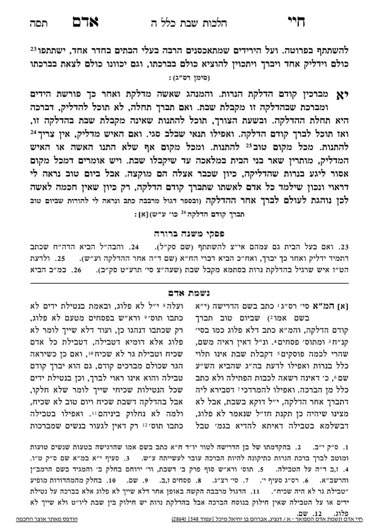We are continuing in siman 11. We left off with a question about amira l’yisroel, and whether a parent who has already accepted Shabbos through hadlakas neiros can ask a child to perform a melacha in the home. Although amira l’yisroel is muttar, the Pri Megadim raises the following question. There is an issur of shevisas behemto, that a person’s animals must be in a state of rest. Thus, for example, it is assur to rent out one’s animal to a non-Jew over Shabbos. The Pri Megadim discusses whether the issur of shevisas behemto applies during the time of tosefes Shabbos. He is unsure about it, and writes that the minhag haposkim is to be meikil.
The same pasuk (Shemos 20:10) which prohibits one’s animals from working on Shabbos also prohibits one’s sons, daughters and slaves from performing melacha on Shabbos. Meaning, whereas the reason to teach a katan to keep the mitzvos is generally the mitzvah of chinuch, regarding Shabbos, one has a chiyuv deoraysa to ensure their child is not performing melacha on Shabbos. If so, it could be argued that there is concern with a parent asking a child to perform melacha once the parent has already accepted Shabbos. Rav Moshe Shternbuch writes in a teshuva that there is a concern of shevisas banav, that once a parent has accepted Shabbos, the parent cannot ask the child to perform melacha for them. Even though the child has no issurei Shabbos yet, and even though the parent has no chiyuv to stop the child from performing melacha (since the child has not yet accepted Shabbos), the parent’s issur of shevisas banav prohibits the parent from giving the child a directive to perform melacha. Although the Pri Megadim has a safeik about shevisas behemto, and concludes that the minhag haposkim is to be meikil (and would apply this leniency to all subjects of the pasuk), Rav Moshe Shternbuch is machmir in this regard.
Regarding the pasuk under discussion, the pasuk also prohibits one from instructing a ger to perform melacha. We are not referring to a ger tzedek, as he is a full-fledged Jew. Rather, the pasuk is referring to a ger toshav, who, under beis din, has undertaken to accept the sheva mitzvos bnei noach. There is a mitzvah in the Torah to support him, and he is treated as a worthy non-Jew. The pasuk teaches us an issur deoraysa to have him do work for a Jew. Even though amira l’achum to a non-Jew is only an issur derabanan, it is an issur deoraysa to a ger toshav.
Whether this issur applies during tosefes Shabbos would fall back into the question of the Pri Megadim, and just as he is meikil regarding shevisas behemto, he would be meikil on this question as well.
Practically, ger toshav only applies in Eretz Yisroel, and we do not have the concept of ger toshav at this time. Rabbi Reingold is unsure how the concept of ger toshav will work at the time of moshiach, but in theory, if the inhabitants of the world become gerei toshav, it would upgrade amira l’achum from an issur derabanan to an issur deoraysa.
Summary
- A family member who has already accepted Shabbos can ask another family member who has not accepted Shabbos to perform melacha.
- Although amira l’achum is derabanan, amira to a ger toshav is an issur deoraysa.



